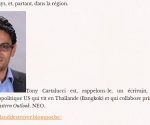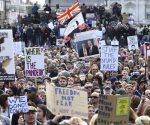Government fights to retake the initiative as BBC looks to get slaughtered by licence fee refusal
It will not have escaped the reader’s notice that in recent weeks the nation has been having a debate about the funding of the BBC. At least, this is how the people who set the agenda for political discourse would no doubt characterise the sudden media environment so that it sounds as if the Government has the slightest bit of interest regarding how the People feel it should lead. In fact, the whole point of making the question of the BBC’s funding a very visible discussion point is to attempt to maintain the illusion that Government leads. For the truth of the matter is that the initiative with regards the BBC has been taken out of the hands of the British ruling class by individuals at the grassroots – in their hundreds of thousands – who have brought market place realities to bear on the BBC by not doing as Government absolutely relies on them to do (and as such, the Government’s weakness is revealed). In the last two or three years, the number of licence fees in force has been haemorrhaging. Prior to this period of time, a governmental review on decriminalisation of the enforcement of the licence fee had recommended that nothing change, and yet in the space of 5 years (the review was processed in 2015) the Government is finding that it has to react to circumstances that it didn’t expect. The so-called “Perry Review” decided that decriminalisation would lead to higher rates of licence fee evasion, and that criminal enforcement was best suited to the way licence fee was collected (“the current system of criminal enforcement should be maintained, at least while the method of licence fee collection remains in its present form”). And yet a disastrous amount of licence fee “evasion” (the BBC defines any household without a licence as evading payment) has happened regardless.
Indeed, such are the state of things that it has become quite apparent that, for Government to react in a way that makes the BBC’s funding model sustainable, it would have to move in the opposite direction to the spirit of decriminalisation: it would have to make legislation close loopholes to make subscribers to on-demand television become liable for a licence; and it would have to give the BBC the draconian tools to make its licence enforcement division much more effective and efficient (all of which potentially could be done along civil enforcement lines). Obviously, and perhaps in the midst of Brexit turmoil (which presented an environment where the BBC could become reviled by those who espied its overt bias in favour of remaining in the EU), such measures would provoke a fight that Government does not want, perhaps fearing further dissipation of the illusion of its strength and right to lead and impose its agenda. And so the Government must move with its usual cunning, and pretend to be a friend to those who actually endanger it.
The Government’s current consultation into decriminalising the licence fee appears to have begun in the first week of February and is set to last for eight weeks, after which there will be a decision whether or not to proceed and make enforcement of the licence fee a thing that must happen in the realm of civil law (explained briefly below). The soup that is discourse in the public arena in relation to the matter has been coming slowly to a boil. A good deal of heat was injected most recently when the Daily Mail reported results of a Freedom of Information request showing a dramatic decline in television licences in force over a year. Much at the same time as this (so one might begin to suspect that it had been coordinated) the sustainability of the licence fee was being discussed everywhere on television (as reported by the internet) from Question Time to Good Morning Britain – and a brief word directed aside must be said about this.
Because it is much more important than any other consideration that the Government impress as many as possible that it is proactive on the issue of the TV licence, the latter of these two television shows is perhaps the more effective conduit for the mass delivery of the required instruction because it sits amongst a day time schedule of magazine-style programming that isn’t supposed to be appreciated as propaganda, but nevertheless teaches its viewers to kowtow to authority; to respect the police and fear debt collectors, etc. The audience of a show like Question Time might think itself somewhat intellectually superior in relation to viewers of the likes of “Motorway Police stop drivers to give them a lecture” (a fictional title for the sake of an example), but what they watch is essentially the same tool as daytime television for creating sanctioned options for opinion to be held by the British general public.
As mentioned above, driving the “debate” is the Government’s consultation on a proposal to decriminalise non-payment of the licence fee. In the zeitgeist that has been whipped up around this, there is a suggestion that the Government wants to scrap the tax altogether and replace it with a subscription service, but this is not part of the remit of the consultation. In fact, the Government literature very plainly states that…
This consultation is not considering any other changes to the TV licence. Information given in these areas may be disregarded.
As such, then, a threat of the effective “end of the BBC”, which is the stuff emanating out of the Prime Minister’s office via The Sunday Times (so one can be sure it is provocation), is a strawman being used to stir controversy, and to enliven the theatre of talking heads inviting a television, and secondarily a print and internet audience to treat the issue along politically partisan lines. As part of this, on Saturday, 22nd February, the national newspapers gave front page coverage to David Dimbleby (the son of Richard Dimbleby), essentially providing a prime example of the ruling class insisting that it remains the ruling class [please note that the word government in the extract is meant to refer to the Tory executive branch; capital G “Government” is actually something more expansive of which Dimbleby himself has been an important component]:
The BBC is under threat in a way it has never been before.
The pernicious route the Government are using is to say the licence fee is wrong or unfair. I don’t believe it is wrong or unfair.
It is a way of damaging and undermining the BBC that is dangerous and should be resisted forcefully if public broadcasting is to survive.
This comment by Dimbleby is an interesting one, soaked as it is with the true totalitarian colours from which it emanates. Theoretically, public broadcasting could be tolerated if it was limited and it was strictly impartial – but, apparently, the BBC is not to be so constrained. Instead, it will operate how it likes and the public will pay for it, and there should be forceful resistance if this model is tampered with. Evidently, Dimbleby is trying to threaten the spectre of industrial action by whatever union’s membership would fear the end of the protectionist racket that it has hitherto enjoyed.
If it weren’t for the real market forces threat to the BBC, when we see a high status operative such as Dimbleby hinting that the Labour movement should organise itself in opposition as if the BBC was a Government-owned coal mine facing closure, we could be forgiven for thinking the Government is just using the licence fee issue to redraw left-right definition into a political landscape after the overshadowing and all consuming issue, Brexit, formed new synapses in the brain of the body politic so that the traditional divide and conquer mechanism could not reproduce past effectiveness. Unfortunately for Government, if this was the case, its machinations couldn’t save the BBC even if people were motivated for or against the BBC according to their political colour. The truth is that in the post-9-11 world, there are enough Britons beyond the pale of the sort of unsophisticated button-pushing that is an appeal to left-right affiliation and loyalty. At long last, the Government has to deal with real factors shaped by the will of a tipping-point number of people, and putting on a show to lead by the nose, or to demoralise, or cause any other outcome by use of an illusion is not going to help.
In truth, in the sector of the British population that has the BBC’s life in its hands, there is no controversy about the BBC licence fee. For these people, too, there is no debate, and no national discussion, there is only self-conviction, and assuredness about what they want either in terms of an entertainment media service, or in terms of the survival of the BBC (i.e. they either don’t want it, or don’t care if it exists or not). These people are not going to be diverted or affected by the talking point theatre, and there are enough of them so that a tipping point has been reached. The BBC operation as we know it is indeed in danger, as Dimbleby says, but not from Government. It is terrible danger from the people who have stopped paying the licence fee, and who will stop paying it in the months and years to come.
So, the public debate, and the triggering consultation, about the future of the enforcement of the funding of the BBC won’t be about mustering up a force to ensure the survival of the BBC in its current form. In actual fact, what is behind it is the revelation of Government weakness whereby BBC frailty has become an issue at all.
It would be bad policy indeed for Government to allow a grassroots movement against it (and that hasn’t actually been organised by it) to succeed because this helps the little man understand that he does indeed have power. To deny this comprehension, Government must step into a process that would otherwise undo it as a champion of the cause and its saviour: for it is all important to maintain the impression that nothing happens unless Government has caused it to happen. As this applies to the BBC, the Government wants to be seen to be taking the initiative on ground where there will inevitably be defeat for the state-controlled, Government mouthpiece, public broadcasting corporation. Any changes that have to be made as a result of licence fee refusal by hundreds of thousands of individuals just acting in their own best interests will then be seen to originate from Government, and Government seen as the controller of destiny.
The previous FBEL article on this subject (As BBC admits licence fee refusal impacts its viability, with the end of over-75 subsidy, even more “evasion” ahead) got to the nub of the crisis, but even without reference to that piece, we can deduce how licence fee refusal has provoked Government when we see that the primary action proposed by Government is the decriminalisation of “evasion” of the TV licence . In what is now an environment where there are greater rates of refusal to pay, the Government is fearful that the BBC’s retort will see the persecution of the most vulnerable demographic. Moreover, if the maintenance of the current system of enforcement will create politically damaging optics where old aged pensioners are jailed for non-payment of the fee, it will be one about which the Government will have great reservations – which truly is an understatement.
In June 2020, 3 million licence fee holding households (in fact, 3.7 according to the Government) where the householders previously qualified for a free licence on the basis that they were over 75-years of age, will no longer be subsidised. This presents a problem because of a combination of two factors: i) it will be inevitable that a lot of these licences in force will cease to be; i.e. they will not be renewed or they will be cancelled after renewal because they are discovered to be unaffordable; ii) the BBC always eventually treats a household without a licence as if it is evading.
The Government, no doubt, is looking at the prospect of thousands, potentially, of over-75s being prosecuted by Capita, its TV licence collection division. It is highly likely that the ex-subsidised will be top priority for recovery action, and seen as soft-targets. Indeed, an inspection of the Government’s literature regarding the consultation shows that there is an express concern of over-75s suffering disproportionately, compared with other age demographics, with persecution and ultimately jail time:
The BBC has set out measures to help those aged over 75 with this transition, but the Government remains concerned that the impact of TV licence enforcement and the risk of criminal sanctions could be disproportionate on this group in particular.
Decriminalisation of non-payment of the licence fee isn’t necessarily going to stop harassment to pay (so Government’s concern about the over-75s really only goes as far as wanting to avoid the extremely bad optics). The Government literature states that a civil law approach would see two possible options: i) licence fee “evaders” will be given a civil monetary penalty (not unlike the “penalty charge notices (PCNs) issued in relation to traffic infractions, including parking fines and unpaid congestion charges”) which will be passed to debt-collection agencies in the ultimate case of non-payment, and ii) unpaid licence fees will be pursued as a money claim in county courts.
The problem that Government has, of course, is that having introduced either or both of these routes for enforcement, before the licensing body could pursue an unpaid TV licence, it would need to obtain proof that a household is evading payment of the TV licence, and that it simply isn’t liable to pay. Those of us who are not indeed liable should be concerned that the Government would like to make us bear the burden of proof; i.e. that we would be treated as guilty until proven innocent.
The British Government is not averse to burying gross injustice in plain sight so that, on a daily basis, it plagues a section of society that doesn’t have the clout to be heard when it complains, nor the finances to pay the fees of the court that would undermine the legal mechanism that persecutes. However, there is perhaps too great a risk that the sort of injustice discussed immediately above would be too overt and obnoxious that Government would not chance it.
Suffice to say, it looks like decriminalisation would represent a loss of power for Government. Indeed, the Government literature on the consultation cites the 2015 review which concluded that after decriminalisation there would be a rise of real evasion (where people watch live TV, but do not own a licence) because the deterrent that had hitherto prevented it would no longer be there.
The introduction of a civil enforcement scheme would be likely to have an impact on evasion levels – the number of people who do not pay for a TV licence when one is required. Moving from a criminal to a civil system of enforcement could create an impression that non-payment of the licence fee is now regarded as less important…
The Perry Review found that the threat of a criminal offence itself was a strong deterrent to TV licence evasion. As such, depending on the exact circumstances, the Review concluded that TV licence evasion rates could increase by up to 3.9% under a civil enforcement scheme.
The Perry Review estimated a likely increase in evasion could mean a loss of up to £156 million in licence fee revenue per year.
When all is said and done, it very much looks as if the Government has been the unintentional author of the BBC’s existential problem by deciding to end the subsidy for old people, and the big mystery in that case is why would Government do such a thing? It could be said in answer that it wasn’t the Government’s doing, and in saying so, one could point to how, as a condition of its most recent charter renewal, the BBC agreed to pay for licences for over-75s. But this is nitpicking. We can assume that the Government/BBC would have covered any loss foreseen from the end of the subsidy with increases to the price of the licence, which have indeed been happening in recent years, and which will continue to happen (the programme is an increase every year for five years starting in 2017). Evidently, however, there was no foresight regarding the extent of the rejection of the TV licence that has also been happening in recent times. The big sudden variation in year-on-year figures for licence fees in force is something that has been covered at FBEL before. However, if the numbers seen by the Daily Mail Freedom of Information request are correct, what is emerging (roughly speaking) is a consistent 200,000 less licence fees in force over an annual period. This was the loss that the Daily Mail found across November 2018 to November 2019, and this is the margin that appeared in a drop of colour TV licence sales that the BBC reported in June 2019 in its Group Annual Report and Accounts 2018/19. Things are not as simple as the forthcoming statement in this sentence make it seem, but on this trajectory, the BBC is looking at a million less licence fees by 2023. And it looks like the Government believes that retaining the criminal enforcement system isn’t going to mitigate this haemorrhaging; in fact, there would be a danger of this supposed tough approach developing a reputation and being seen as an animal with lots of roar, but absolutely no bite.
If the British Government is an entity that looks overwhelmingly powerful, the truth is that these days we can say that it is a loser. Crucially, it lost the EU referendum result – which has cost it dearly, and to an extent that there is no space to expand into here and now. Suffice it to say, (and this is the author’s opinion), the BBC has been collateral damage as a result of the way it obtusely, and with no fear of reprisal, went about its propagandising in favour of the Government’s position on the EU within an emergent and new context of operation where a large and dissenting portion of the audience felt that there was more at stake than usual so that it couldn’t just keep overlooking the BBC’s bias.
Ultimately, what happened is that enough people remembered that those who pay should call the shots: the BBC has had a battering encounter with market realities brought to bear by individuals who refuse to be liable for a licence fee (and even some who are liable, but see no obligation towards the upkeep of the BBC). This is the very significant difference in the political landscape between 2015, when the Perry Review decided that the current method of enforcement should be retained, and now when the Government realises that retaining it is going to be an enormous problem. Indeed, when one tries to imagine the future for enforcement of BBC funding, it would be no wonder that members of the Tory Executive branch are making sounds about total abolishment of the licence fee. Right at the crux of the issue is that there is no solution to compel the British people to pay for the BBC because the product is increasingly unsalable. Be that as it may, the Government will not be prepared to see the corporation be starved to death by the market, and will act to maintain its own image as the prime mover without which nothing comes into being, and nothing can be abolished. What the Government has decided to do about the funding of the BBC will be known according to the Government’s own timetable, but in the end it is irrelevant. Hundreds of thousands of individuals at grassroots have already taken the matter into their own hands, and are killing the BBC – with no reference to Government, and neither without any fear of the BBC’s enforcement capability that is already wholly inadequate.


















